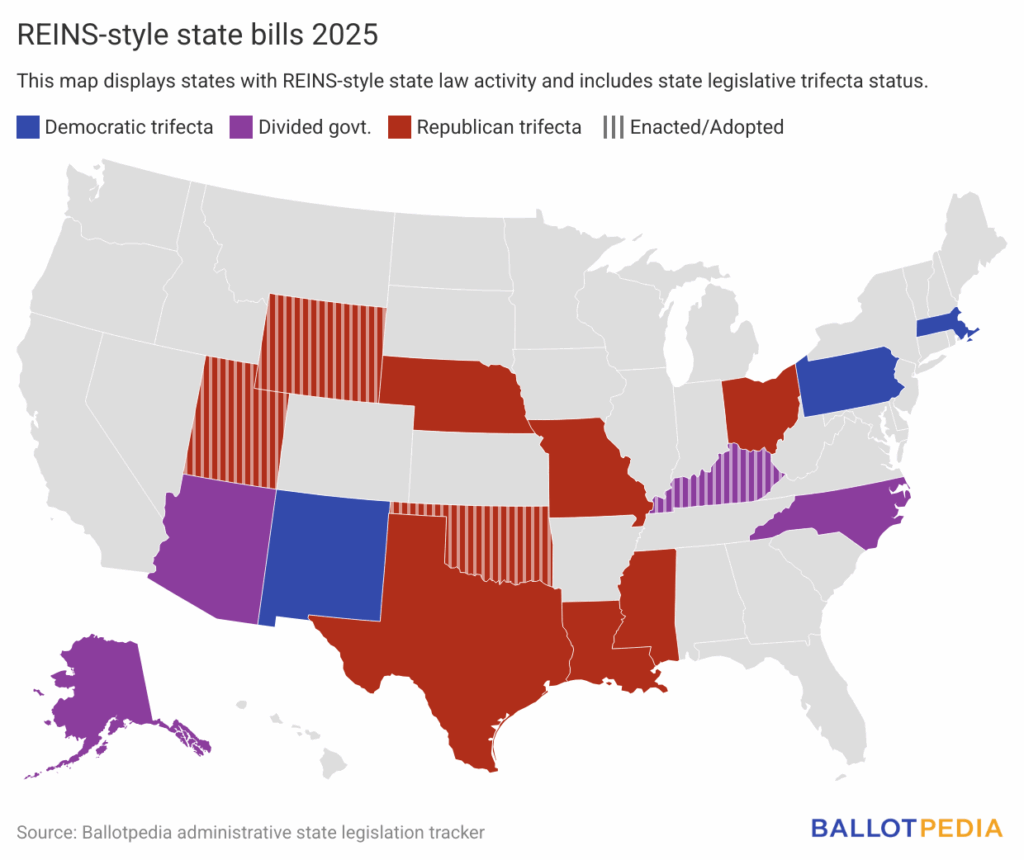Governor Kevin Stitt (R) signed House Bill 2728, titled Oklahoma’s Regulations from the Executive in Need of Scrutiny (REINS) Act of 2025, on May 21. HB 2728 directs the Legislative Office of Fiscal Transparency (LOFT) to independently review and verify economic impact statements for rules with implementation and compliance costs exceeding $1 million over five years and to report on these rules to the legislature. These are defined as major rules by the bill.
Senate Bill 995, enacted on May 27 without Gov. Stitt's signature, amends the Oklahoma Administrative Procedures Act (APA) to require that all permanent rules, including major rules defined in HB 2728, be approved by a joint resolution of the Legislature to take effect.
Together, these bills mandate that major rules undergo both LOFT’s independent economic review (per HB 2728) and explicit legislative approval via joint resolution (per SB 995). Before SB 995’s passage, the APA (under Title 75, Section 308.3) used omnibus joint resolutions to approve a package of rules and, if a joint resolution failed to pass both houses of the legislature the governor had authority to declare those rules approved and finally adopted by publishing a single declaration in "The Oklahoma Register".
SB 995 reverses the previous omnibus approval method and specifies that all permanent rules, including major ones, now require a proactive joint resolution for approval to take effect. If they do not receive legislative approval, they are automatically disapproved. The requirement in HB2728 prohibiting combining major rules into an omnibus bill is another related mechanism in this REINS-style state bill.
The state House passed HB 2728 on Feb. 20 by a vote of 86-3. The state Senate passed an amended version 37-7 on May 1. The state House approved the amended version 74-12 on May 14, and Gov. Stitt (R) signed it on May 21. In the House, 68 Republicans and six Democrats voted for the bill, and 10 Democrats and two Republicans voted against the bill. In the Senate, 36 Republicans and one Democrat voted in favor of the bill, and seven Democrats voted against it.
The state House passed SB 995 on May 7 by a vote of 87-0, and the state Senate passed it on May 15 by a vote of 33-8. The bill became law on May 27 without Gov. Stitt's signature. In the Senate, all eight Democrats voted against the bill.
HB 2728 and SB 995 create a REINS-style state law for Oklahoma. A REINS-style state law is a legislative proposal modeled after the federal Regulations from the Executive in Need of Scrutiny (REINS) Act. A state has a REINS-style state law if it has the following two requirements: (1) a cost-benefit analysis requirement that defines a specific financial impact threshold and (2) proactive legislative action on any agency rule above the threshold before that rule can be adopted.
HB 2728 includes several major provisions that relate to cost-benefit analysis for state agencies adopting major rules:
- Defines major rules as a rule that could result in implementation and compliance costs of more than $1 million over the initial five-year period after implementation.
- Prohibits major rules and non-major rules from being combined in a single joint resolution for legislative review and approval or disapproval.
- Directs the Legislative Office of Fiscal Transparency (LOFT) to independently review and conduct enhanced rule impact analyses for proposed rules and outlines specific criteria that must be included.
- Increases oversight of emergency rules by establishing a timeline for the governor's review and permits waivers of the legislative approval process by the governor during declared emergencies.
SB 995 repeals Title 75, Section 308.3, of the Oklahoma Administrative Procedures Act and explicitly defines the legislative approval process for all proposed rules. The bill changes the previous approval method where the Governor could approve a package of rules and specifies that all permanent rules, including major ones, now require a proactive joint resolution for approval to take effect. If they do not receive legislative approval, they are automatically disapproved.
Under the bills, the governor could veto a legislative joint resolution that disapproves of a rule, and if the legislature does not override the veto, the rule would become effective.
Background
The federal REINS Act would increase legislative oversight of administrative agency rulemaking by requiring legislative approval of agency regulations with an annual financial impact estimated at $100 million or more or that meet other criteria before the regulations become effective. Versions of the REINS Act have been introduced as legislation in every Congress since 2009, and similar provisions are included in the One Big Beautiful Bill act, the 2025 budget reconciliation bill.
Oklahoma's REINS Act of 2025 (HB 2728) does not, on its own, modify the Oklahoma State Administrative Procedures Act section governing legislative approval or disapproval before a rule becomes effective, but does provide information on the economic impact that can be used by the legislature to approve or disapprove of a proposed rule. HB 2728 provides a series of oversight definitions that, when combined with Senate Bill 995's provisions, create the criteria for all rules to require legislative approval with an added focus and additional requirements for major rules.
Cost-based analyses of agency rules require an entity to review and evaluate the impact of agency rules that are expected to exceed a certain cost threshold over a specified period. REINS-style state laws differ on the cost threshold and across how much time, whether non-quantifiable or social costs are included, and who completes the evaluation. The evaluator can be a legislative committee, a legislative office, an independent reviewer, or an agency entity.
REINS-style state laws require legislative action before the agency rule can go into effect. The degree of legislative action varies; it can be legislative review by a legislatively controlled body, approval through a joint or concurrent resolution, or enactment of a statute that approves a rule.
This year, Oklahoma enacted a set of four significant bills, including HB 2728, related to the administrative state and decreasing the authority and influence of state agencies. HB 2728 and SB 995 were related to legislative control. The other two were related to judicial control and executive control, respectively:
- House Bill 2729 changes judicial deference standards and requires state courts to interpret state statutes and regulations independently rather than deferring to a state agency’s interpretation. This follows the U.S. Supreme Court’s June 2024 decision to overturn the Chevron doctrine.
- Senate Bill 1024 prohibits the adoption of a proposed rule by an agency unless the agency receives approval from the governor or the appropriate cabinet secretary.
The Oklahoma Legislature adjourned on May 30, 2025. Ballotpedia tracked 36 other bills in Oklahoma during the 2025 session related to the administrative state.
Oklahoma is a Republican trifecta state. The Republican Party controls the office of the governor and both chambers of the state legislature. Republicans won control of the Oklahoma House of Representatives in 2004. As of May 2025, they have an 80-18 majority. Republicans won control of the Oklahoma State Senate in 2008. As of May 2025, they have a 40-8 majority.
Where’s the fight?
State Sen. Michael Bergstrom (R) said, “Oklahomans deserve a government that is transparent and accountable, and one that does not impose unnecessary or excessive regulations. By restoring legislative oversight of the administrative rules process, we are ensuring that regulations reflect the will of the people—not just the preferences of state agencies.”
HB 2729 Sponsor Oklahoma State Rep. Gerrid Kendrix (R) wrote, “...Now is the time to bring meaningful reform to Oklahoma’s administrative rules process, and any such reform must begin with restoring the Legislature’s rightful role as the primary policymaking body.”
Some critics of the federal REINS Act, such as The Public Citizen, argue the policy threatens the separation of powers and politicizes the regulatory process, writing “The REINS Act would inappropriately – but deliberately – inject political considerations into a regulatory process that is supposed to be based on objective agency science and expertise. Federal agencies employ personnel with policy, scientific, and technical expertise to produce smart and sensible regulations.”
REINS activity in the states
Ballotpedia tracks and analyzes legislation such as OK HB 2728 as part of our administrative state legislation tracker. REINS-style state laws are a type of legislative oversight over agency rules. It falls in Ballotpedia's legislative control pillar, which focuses on the balance of power between administrative agencies and the legislative branch. The legislative control pillar is one of the five pillars Ballotpedia uses to understand the administrative state.
In 2025, Ballotpedia is tracking REINS-style bills or other bills increasing legislative oversight based on an economic impact threshold in 16 states. Four of these bills have been enacted in 2025 so far: Kentucky, Utah, Wyoming, and Oklahoma.

See Also:



